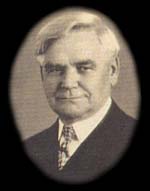
|

|
| Daddy Raker (1866-1938) |
William Samuel Raker was born August 25, 1866, in New York. He came to Oregon in
1905 as a salesman with Northwestern Mutual Life. Mr. Raker was married and had two children, a son, Sam. W., and
a daughter, Mary E. He made a hobby of the study and conservation of bird life and was active with the Izaak
Walton League and the Oregon Humane Society and was the former Director of the Oregon Audubon Society.
W. S. Raker was invited to sit on the Executive Board of the Camp Fire Girls of Portland in 1922. The commitment
for that position required "one hour per month, with summer holidays out."
After showing an interest in the summer camp held near Carver, on the Clackamas River, W. S. Raker was appointed
Chairman of the Camping Committee. A temporary site was chosen on Eagle Creek, but Mr. Raker began a search for a
more suitable permanent location. Mr. Raker and Eathel Moore discovered the site on the Sandy River owned by
Samuel Cobb. They convinced him to donate it to Camp Fire Girls and Mr. Raker began immediately to improve the
site.
In 1937, Daddy Raker compiled a scrapbook history of Camp Namanu that won a blue ribbon at the National Camp Fire
convention in Lincoln, Nebraska. The book was bound in dogwood grown at the camp and the front cover was a
replica of the front door of the Weavery.
Carreth Wells, a well-known lecturer of the time, said of Daddy Raker, "He was a typical American gentleman of the
old school, genial, courtly, and intensely loyal to the Rose City."
As Chairman of the Camp Fire Camp Committee, Daddy Raker took part in the Grand Council Fires. On Saturday, March
19, 1938, the day of a scheduled Grand Council Fire, W. S. Raker died of a heart attack in a shoe shine parlor,
with the notes for his evening’s speech in his pocket. "He had answered the call from which there is no turning
away."
In a public tribute at his death the following was written about him: "...(the) success of the camp (Namanu) has
been due more to his unremitting efforts than anything else. It is a veritable monument."
Full-unabridged text of this chapter is available in the 75th Anniversary Book which is for sale at the
Camp Fire USA Portland Metro Council's office in Portland.
©1998 Reprinting only with written permission of Camp Fire USA Portland Metro Council.
|